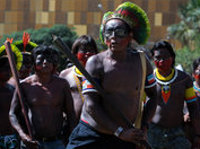
Roots of cannibalism in Papua New Guinea remain mystery to all

New Guinea has made it to the top of the world's major newsmakers. Unfortunately, the news from Oceania is not optimistic. Cases of cannibalism and so-called "witch hunt" have become more frequent in the island nation. People are scared to leave their homes at times.
The state of Papua New Guinea, located on a huge tropical island between the Pacific and Indian oceans, enjoys doubtful reputation. On the one hand, the country has mild equatorial climate, exuberant vegetation, and a relatively small number of predatory animals. All this makes one think of an earthly paradise.
In the 20th century, scientists discovered a sizeable plateau with relict species of animals, who were not afraid of humans at all. On the other hand, cannibalism has been prospering on the island from time immemorial. To crown it all, there are dangerous prejudices in the country associated with beliefs in witches and sorcerers. Anyone suspected of such activities would be punished brutally.
As for cannibalism, last summer, for example, a group of cannibals was about to disrupt the parliamentary elections in one of the provinces of the country, which gained independence from Australia in 1975. Frightened with stories of mass cannibalism, people were afraid to leave their homes. Many of them preferred not to step outside on the voting day. Later, 29 people, accused of cannibalism, were brought to trial. However, according to experts, a group of the population practicing cannibalism in the above-mentioned region of the country has 700-1,000 members.
Interestingly, it was in New Guinea, where "slow viruses" or "prion" infections were discovered. The most famous one of them is "mad cow disease". The Kuru disease, aka "laughing death" was found with the Papuans of New Guinea, who like to eat human flesh. Many scientists believe that "prion infections" were created by nature as a barrier to stop humans from eating other humans.
Let's get back to the cannibals, who nearly ruined the elections. To explain the cause of their, putting it mildly, inhumane behavior, they said that they wanted to do away with malevolent sorcerers! Allegedly, they ate only the people who had cast an evil spell on their neighbors. The "avengers" allegedly obtained protection from black magic after the bloody meal.
Before local laws, the cannibals enjoyed significant preferences. The act adopted on the island in 1971 recognized killings of witches and sorcerers as "mitigating circumstance." The punishment for murderers in this case was much softer.
The most interesting aspect is that the majority of the population of New Guinea is Christian, at least formally. There are people, who adhere to local beliefs. However, despite a very tough position of local authorities and the Christian church in the struggle against bloody prejudice, the results leave much to be desired so far.
A terrible story that took place in the city of Mount Hagen in February of this year, put things into motion. A group of relatives of the boy, who had died at hospital from a pathology of the abdominal cavity, accused 20-year Qeparo Leniata, the young mother of the eight-month-old baby, of casting an evil spell on the child. Afterwards, the killers stated that "the witch confessed to everything herself."
Anyone, who would be stripped naked and tortured with a red-hot iron would do the same. Having received such a "voluntary confessions," the criminals tied the victim's hands and feet and threw her into the fire of burning tires. Many tourists and onlookers were filming the monstrous execution on their cell phones. The police did not dare to interfere until the victim died in the fire.
The case received an extensive coverage in international media, and the authorities of the country, in May of this year, finally abolished "the law of witchcraft" that provided mild sanctions to murderers.
However, in early June, village teacher Helen Rambali was accused of witchcraft. Initially, the scenario vividly recalled the story above: a dead teenager, witch-hunt and the capture of "the culprit." The woman was tortured with knives. The victim was decapitated, her house was burnt down. The husband and son of the killed teacher worked as government officials. If the government can not protect the wife and mother of government officers, what can be said about peasants in remote villages?
Scientists and criminologists try to find out the reasons that led to such a surge in sectarian killings on the island? Is it the echoes of ancient beliefs? Beliefs in witches and witchcraft are present on neighboring islands too, but they do not end up with such massacres. For example, in the western part of New Guinea, annexed by Indonesia, there are no atrocities like that.
Yuri Nosovsky
Pravda.Ru